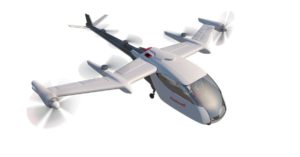
Honeywell purchased Ballard Unmanned Systems’ “key intellectual property, inventory and equipment of Ballard Unmanned Systems,” says the release. “Ballard’s team of fuel-cell experts will also join Honeywell as part of the acquisition.”
“Adding Ballard Unmanned Systems to the Honeywell family is another example of our commitment to invest in the growing UAS segment,” said Mike Madsen, president and chief executive officer, Honeywell Aerospace. “We can now begin producing top-quality, scalable power systems for our UAS customers and eventually adapt these systems for other future aerospace, defense and adjacent segment applications.”
The traditional batteries used by most commercial drones today have significant limitations: sooner or later, they run out of power and need to be recharged, limiting flight times. Fuel cells offer an alternative to traditional batteries, using the chemical energy of hydrogen or another fuel to produce electricity. Hydrogen fuel cells can offer drones longer flight times without recharging, critical for beyond visual line of sight (BVLOS) applications like passenger drones and cargo delivery.
“Ballard Unmanned Systems’ fuel cell power systems can run up to three times longer than batteries and are five times more reliable than small engines. Furthermore, unlike traditional gas engines that have carbon emissions, they utilize hydrogen, a clean source of energy.”
“With the added capabilities of Ballard Unmanned Systems, Honeywell intends to introduce a family of fuel cell power systems for a variety of UAS vehicles. Honeywell will also collaborate with Ballard Power Systems on broader aviation applications,” says the release.

Miriam McNabb is the Editor-in-Chief of DRONELIFE and CEO of JobForDrones, a professional drone services marketplace, and a fascinated observer of the emerging drone industry and the regulatory environment for drones. Miriam has penned over 3,000 articles focused on the commercial drone space and is an international speaker and recognized figure in the industry. Miriam has a degree from the University of Chicago and over 20 years of experience in high tech sales and marketing for new technologies.
For drone industry consulting or writing, Email Miriam.
TWITTER:@spaldingbarker
Subscribe to DroneLife here.